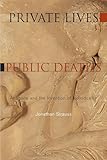Private Lives, Public Deaths : Antigone and the Invention of Individuality / Jonathan Strauss.
Material type: TextPublisher: New York, NY : Fordham University Press, [2022]Copyright date: ©2013Description: 1 online resource (232 p.) : 1 Illustration, black and whiteContent type:
TextPublisher: New York, NY : Fordham University Press, [2022]Copyright date: ©2013Description: 1 online resource (232 p.) : 1 Illustration, black and whiteContent type: - 9780823251339
- 9780823292448
- online - DeGruyter
| Item type | Current library | Call number | URL | Status | Notes | Barcode | |
|---|---|---|---|---|---|---|---|
 eBook
eBook
|
Biblioteca "Angelicum" Pont. Univ. S.Tommaso d'Aquino Nuvola online | online - DeGruyter (Browse shelf(Opens below)) | Online access | Not for loan (Accesso limitato) | Accesso per gli utenti autorizzati / Access for authorized users | (dgr)9780823292448 |
Frontmatter -- Contents -- Acknowledgments -- Note on Greek Transliterations -- Introduction: Tragedy, the City, and Its Dead -- 1. Two Orders of Individuality -- 2. The Citizen -- 3. Loss Embodied -- 4. States of Exclusion -- 5. Inventing Life -- 6. Mourning, Longing, Loving -- 7. Exit Tragedy -- Appendix A: Summary of Sophocles’s Labdacid Cycle -- Appendix B: Timeline of Relevant Events in Ancient Greece -- Notes -- Works Cited -- Index
restricted access online access with authorization star
http://purl.org/coar/access_right/c_16ec
In Private Lives, Public Deaths, Jonathan Strauss shows how Sophocles’ tragedy Antigone crystallized the political, intellectual, and aesthetic forces of an entire historical moment—fifth century Athens—into one idea: the value of a single living person. That idea existed, however, only as a powerful but unconscious desire. Drawing on classical studies, Hegel, and contemporary philosophical interpretations of this pivotal drama, Strauss argues that Antigone’s tragedy, and perhaps all classical tragedy, represents a failure to satisfy this longing. To the extent that the value of a living individual remains an open question, what Sophocles attempted to imagine still escapes our understanding. Antigone is, in this sense, a text not from the past but from our future.
Mode of access: Internet via World Wide Web.
In English.
Description based on online resource; title from PDF title page (publisher's Web site, viewed 03. Jan 2023)


